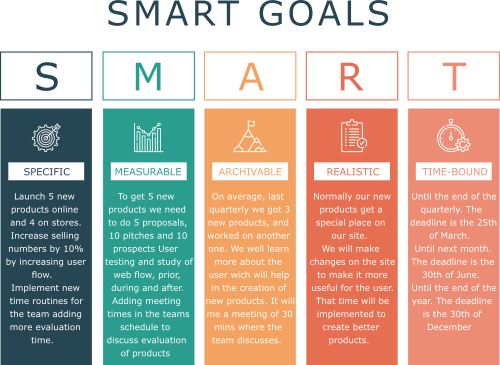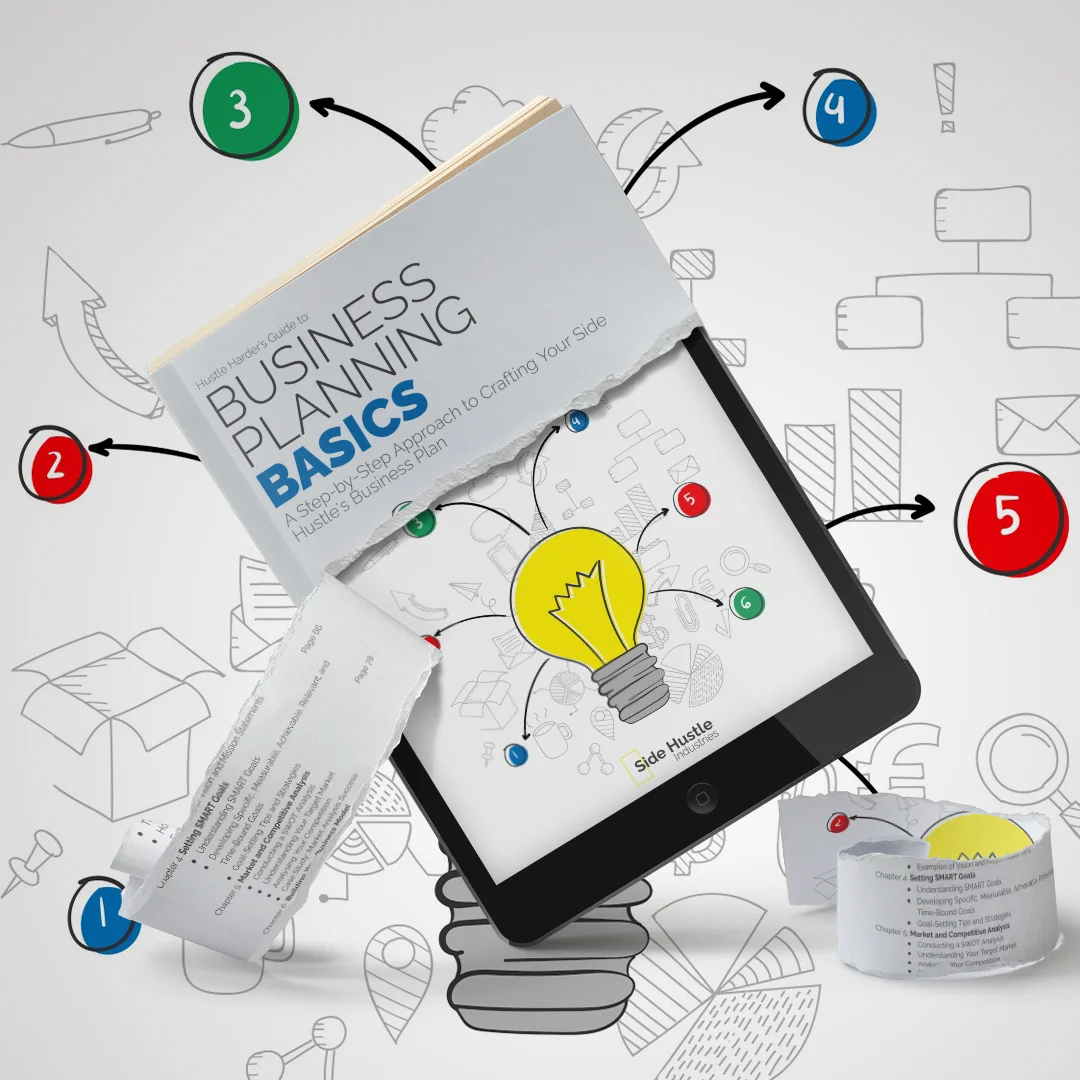
Goal setting is an integral part of the entrepreneurial journey. Whether you’re launching a startup or growing your side hustle, setting goals can provide you with clarity, focus, and a roadmap for your business. But not all goals are created equal. To make your goals effective and achievable, it’s essential to follow a structured approach. This is where SMART goals come into play. In this blog, we will delve into the concept of SMART goals, exploring what they are, why they matter, and how to apply them to your business planning.
What Are SMART Goals?
SMART is an acronym that stands for Specific, Measurable, Achievable, Relevant, and Time-bound. SMART goals are a framework for setting objectives that are clear, well-defined, and attainable. Let’s break down each component of the SMART acronym:
1. Specific:
Specific goals are clear and well-defined. They answer the who, what, where, when, and why of your goal. Specificity ensures that everyone involved knows exactly what is expected and what success looks like.
Example of a specific goal: “Increase monthly website traffic by 20% in the next six months by publishing two blog posts per week.”
This goal specifies the desired outcome (a 20% increase in website traffic), the time frame (in the next six months), the actions to take (publishing two blog posts per week), and the reason (to increase website traffic).
2. Measurable:
Measurable goals allow you to track progress and determine when you’ve achieved your objective. They provide a quantifiable way to evaluate success.
Example of a measurable goal: “Increase monthly revenue from $5,000 to $7,500 in the next three months.”
This goal is measurable because it provides a clear numerical target (an increase from $5,000 to $7,500) and a timeframe (the next three months) for assessing achievement.
3. Achievable:
Achievable goals are realistic and attainable given the resources, time, and constraints at hand. While ambition is valuable, setting goals that are unattainable can lead to frustration and demotivation.
Example of an achievable goal: “Launch a new product line within the next year, leveraging our existing production capabilities and budget.”
This goal acknowledges the available resources and the timeframe, making it realistic and achievable.
4. Relevant:
Relevant goals align with your overall objectives and mission. They contribute to your business’s growth and success. It’s essential to ensure that your goals are relevant to your side hustle’s vision and mission.
Example of a relevant goal: “Increase social media engagement by 25% in the next three months to better connect with our target audience and promote our eco-friendly products.”
This goal is relevant because it directly supports the company’s mission of promoting eco-friendly products and connecting with the target audience.
5. Time-bound:
Time-bound goals have a defined timeframe or deadline for completion. This component provides a sense of urgency and helps in time management.
Example of a time-bound goal: “Launch a new marketing campaign by the end of this quarter to boost customer acquisition.”
This goal specifies a clear deadline (by the end of the quarter) for launching the marketing campaign, ensuring it remains on track and within a reasonable timeframe.

Why SMART Goals Matter
SMART goals are more than just a framework; they are a powerful tool for achieving your entrepreneurial objectives. Here’s why SMART goals matter in your business planning:
- Clarity: SMART goals provide clarity. They eliminate ambiguity and ensure everyone involved understands what is expected and how success is defined.
- Motivation: SMART goals can be motivating. When goals are specific, measurable, and time-bound, you and your team are more likely to stay engaged and committed.
- Accountability: SMART goals create accountability. With clear objectives and measurable outcomes, it’s easier to track progress and determine responsibility for different aspects of goal achievement.
- Efficiency: SMART goals promote efficiency. By setting well-defined, achievable goals, you can allocate resources more effectively and minimise wasted effort.
- Adaptability: SMART goals can be adapted. If circumstances change, you can adjust your goals while still adhering to the SMART framework, ensuring that they remain realistic and attainable.
- Evaluation: SMART goals facilitate evaluation. With quantifiable criteria, you can objectively assess whether a goal has been achieved or requires further attention.
- Alignment: SMART goals align with your business’s mission and vision. They ensure that your goals are relevant and contribute to your overall business objectives.
Applying SMART Goals to Your Business Planning
To apply SMART goals to your business planning, follow these steps:
1. Identify Your Goals:
Begin by identifying the specific objectives you want to achieve. Whether it’s increasing revenue, expanding your customer base, or launching a new product, define your goals clearly.
2. Make Them Specific:
Ensure that your goals are specific by answering the who, what, where, when, and why. This eliminates ambiguity and provides a clear target.
3. Quantify and Measure:
Quantify your goals so that you can measure progress. Assign numerical values or metrics to your goals to make them measurable.
4. Assess Feasibility:
Determine whether your goals are achievable given your resources and constraints. Be realistic about what you can accomplish.
5. Align with Your Mission:
Ensure that your goals are relevant to your business’s mission and vision. They should contribute to your overarching objectives.
6. Set Deadlines:
Assign specific deadlines or time frames to your goals. This creates a sense of urgency and ensures that you stay on track.

Real-Life Example: Applying SMART Goals
Let’s say you’re running a side hustle that offers online fitness coaching. Your goal is to increase the number of clients in the next six months. Applying the SMART framework, your goal might look like this:
- Specific: “Acquire 50 new online fitness coaching clients in the next six months by expanding our marketing efforts and offering a limited-time discount.”
- Measurable: You’ve set a specific target of 50 new clients, which is a quantifiable measure of success.
- Achievable: You’ve assessed your marketing budget and the potential for expansion, making the goal realistic.
- Relevant: Increasing client numbers aligns with your mission of helping more individuals achieve their fitness goals.
- Time-bound: You’ve set a timeframe of the next six months, providing a clear deadline for achieving the goal.
This SMART goal provides a clear roadmap for acquiring new clients. It outlines the target, the strategy for achieving it, and the timeframe for completion.
Incorporating SMART goals into your business planning is a valuable practice that can enhance your goal-setting process. It ensures that your objectives are clear, realistic, and aligned with your business’s mission. As you proceed with your entrepreneurial journey, you’ll find that SMART goals provide you with a structured and effective way to achieve your dreams and aspirations.

*Also available on Amazon in Kindle, Soft Cover & Hard Cover formats. —> Click Here.
